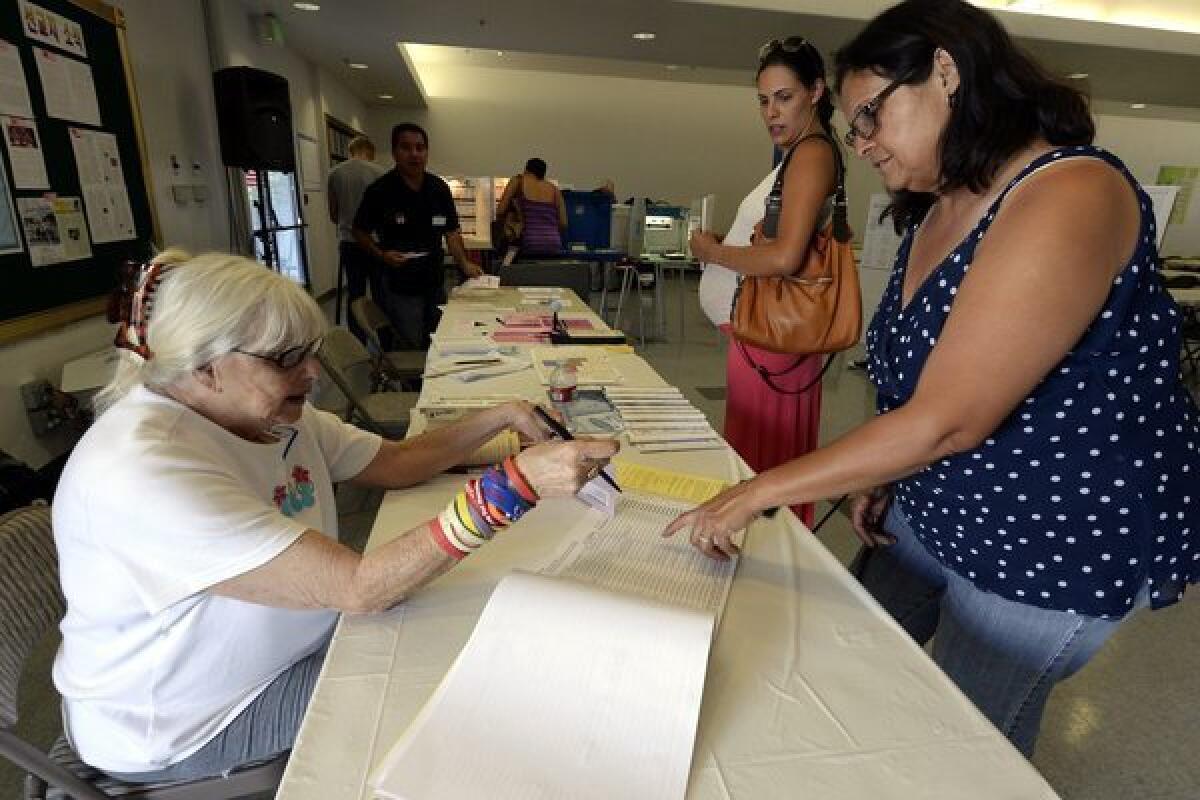The California exception on immigration

- Share via
The fight for immigration reform has landed in the lap of House Republicans, which is a bad place for it to land. Though it’s hard to see a way that Republicans can retake the White House as long as they remain intent on denying citizenship to Latinos and Asians who are in the country illegally, the House Republicans seem blissfully indifferent to political consequences. By controlling just one house of Congress, they have discovered, they can bring government either to a standstill or close to it, and increasingly, that seems to be their raison d’etre.
The House Republicans have shown themselves to be indifferent not just to the needs of the nation but to the needs of their party and even the credibility of their own speaker. They seem to fear nothing save their own defeat, and for most House Republicans, nestled comfortably in gerrymandered districts, that means the only thing they have to fear is a primary challenge from some tea party zealot if they ever vote for something that also has the support of President Obama or congressional Democrats.
The big exception is California.
U.S. IMMIGRATION LAW: Decades of debate
Of the state’s 53 House members, 15 are Republicans, and those 15 are among the few House GOP-niks who have to worry about more than a primary challenge from their right. Thanks to the nonpartisan redistricting that state voters established by initiative, a number of those 15 have districts that are neither safe nor overwhelmingly white. Indeed, a number have districts that are heavily Latino or Asian, and that doesn’t bode well for the representatives’ long-term (and in some cases, short-term) electoral prospects if they oppose a path to citizenship for those who are in the country illegally.
Of the 234 House Republicans, only 38 represent districts with populations that are at least 20% Latino — but 12 of those 38 come from California. Nine of these Californians represent districts that are at least one-third Latino; three of them represent districts in which Latinos have a plurality; seven represent districts where whites make up less than 50% of the population. In David Valadao’s San Joaquin Valley district, for example, 19% of the residents are white, while 71% are Latino. Obama carried the district last year with 55% of the vote.
In Gary G. Miller’s Inland Empire district, which Obama carried with 57% of the vote, Latinos outnumber whites by 49% to 30%. In two other Los Angeles-area districts, Howard P. “Buck” McKeon’s in northern Los Angeles County and Ed Royce’s in Orange County, Obama won 48% and 47% of the vote, respectively. Latinos constitute 35% of the population in McKeon’s district. They come to 33% in Royce’s, and Asians constitute an additional 39%.
SLIDE SHOW: Five most important immigration reform issues
There are, to be sure, disproportionately fewer Latino voters than Latino residents, both because some aren’t citizens and because so many Latinos are young. The median age of U.S. Latinos is 27; of U.S. whites, it’s 42. Latinos make up 51% of Californians younger than 18. Today’s population percentages are likely to become tomorrow’s voter participation percentages.
In other words, for at least half if not more of California’s Republican House members, a vote against citizenship for those who are in the country illegally, or the Republican caucus’ refusal to let such a vote be taken, is politically suicidal — if not in 2014, then by the decade’s end. Then again, GOP congressional representatives indifferent to winning the White House may be just as indifferent to the prospect of their party losing their districts once they’ve stepped down.
But even if the most rudimentary kind of enlightened self-interest is beyond many House Republicans, there remains the question of the duty of an elected representative, and whether he is the tribune merely of the electorate or of the entire population of his district. The nine California Republicans whose districts are at least one-third Latino, not to mention those with heavily Asian districts, have thousands of constituents for whom immigration reform means that they, their friends or relations will be able to come out of the shadows and live more productive and normal lives. They may not factor just yet in these Republicans’ electoral calculations, but they should certainly factor in these Republicans’ economic and moral calculations.
SPECIAL REPORT: Is the border secure?
Just how many constituents can a representative safely, or ethically, imperil? That’s the question, like it or not, before California’s House Republicans.
Harold Meyerson is editor at large of the American Prospect and an op-ed columnist for the Washington Post.
More to Read
A cure for the common opinion
Get thought-provoking perspectives with our weekly newsletter.
You may occasionally receive promotional content from the Los Angeles Times.









